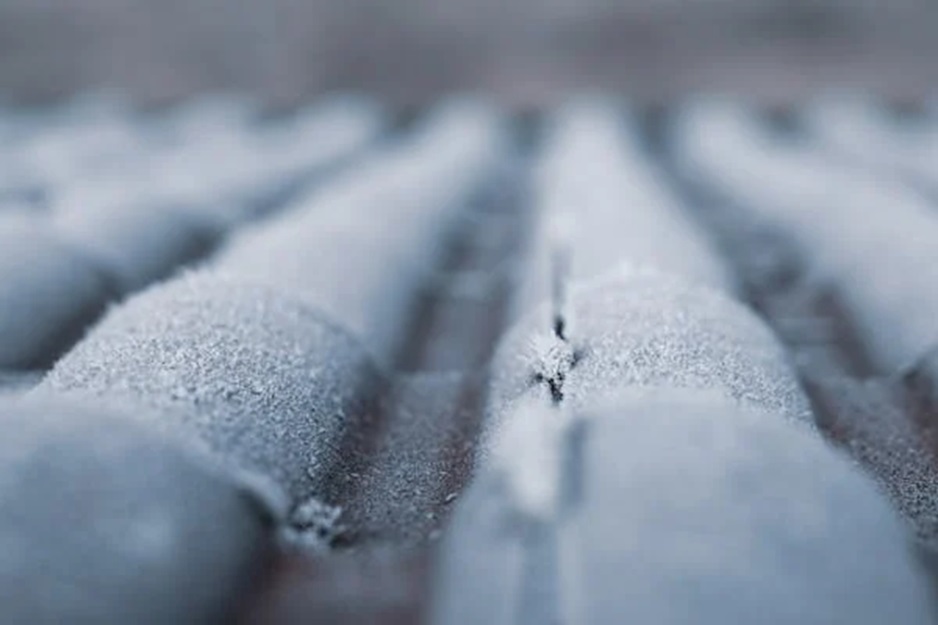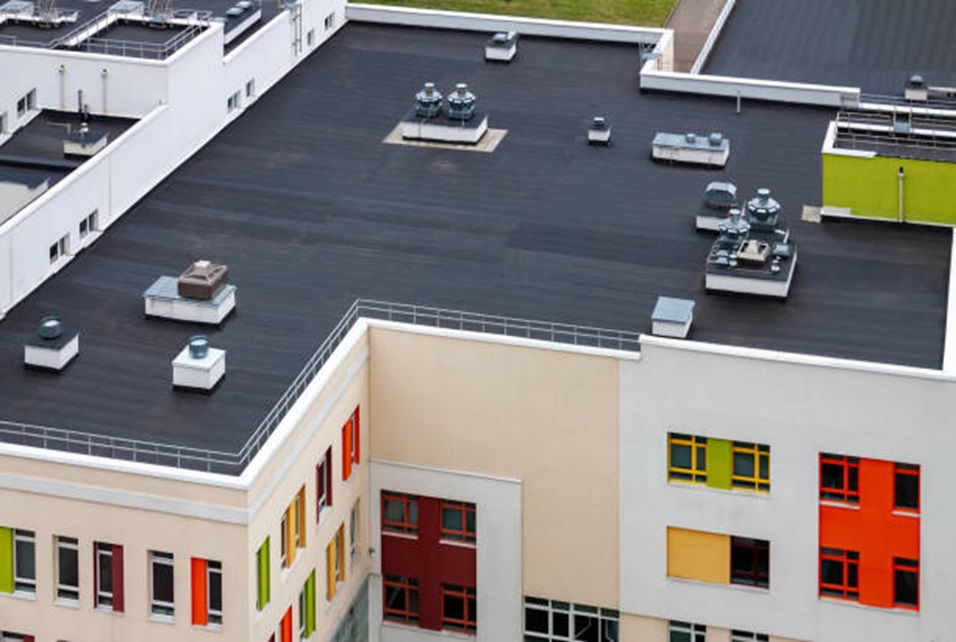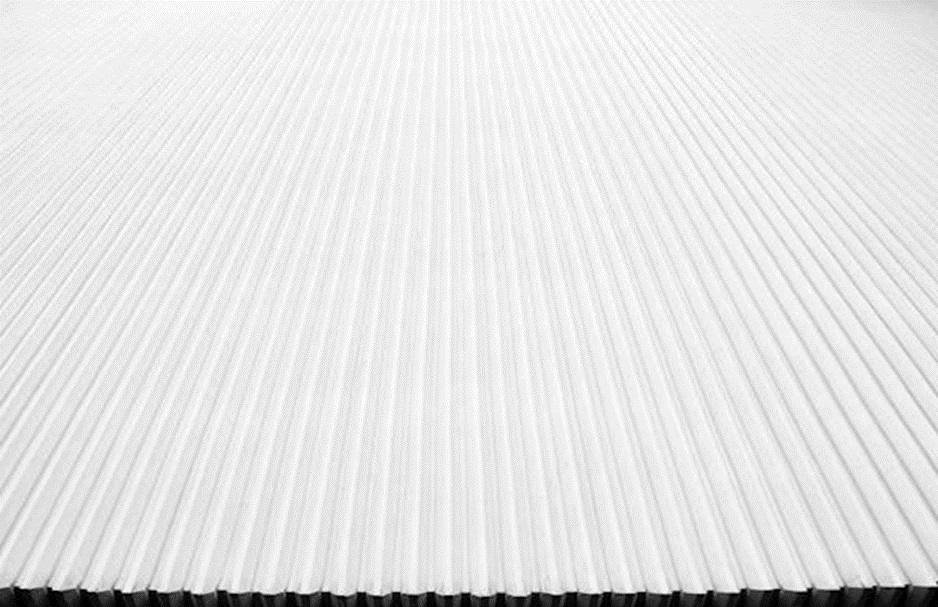You may make decisions that will help the long-term success of your organization by arming yourself with knowledge regarding commercial roof replacement services. Now let’s dig into this comprehensive guide and discover the techniques for guaranteeing a sturdy and dependable roof for your business or industrial building.
What Goes into Replacing a Commercial Roof?
The process of replacing a business building’s old roof system with a new one is known as commercial roof replacement. It’s a big project that needs to be planned carefully, handled by professionals, and done by local construction standards and regulations. The following are the main procedures for replacing a commercial roof:

Examination and Evaluation
A comprehensive examination is carried out to assess the state of the current roof. This entails determining any leakage, damage, or structural problems that need replacing or repairing.
The right roofing materials are chosen for replacement by the assessment. Several factors include the building’s location, climate, and budget.
Obtaining the required permissions and approvals from local authorities is a need before beginning the roof service replacement project. It is imperative to adhere to building laws and regulations that are relevant to commercial roofing.
All components of the previous roof, such as the insulation, old membrane, and any additional layers, are removed with care. To guarantee a safe and effective removal, this procedure requires specific instruments and equipment.
Making Substrate Repairs
The deck or roof substrate is examined for deterioration or damage. The necessary replacements or repairs are carried out to guarantee a solid base for the new roofing system.

New Roof Installation
The specified materials and design are used to install the new roofing system. This entails installing the waterproofing membrane, placing layers of insulation on top of it, and fastening it in place using adhesives or bolts. To guarantee appropriate operation, additional components such as drainage systems and flashing are required.
Inspections and Quality Assurance
Frequent inspections are carried out during the commercial roof installation process to guarantee high-quality work and adherence to specifications. To find any possible problems, this can entail using thermal imaging, leak detection, or moisture testing.
It’s critical to get comprehensive quotations from roofing contractors who can evaluate your unique requirements and offer precise cost estimates to your project specifications. For a full list of requirements, visit SW Commercial Roofing website and create a checklist.
Budgeting should also take into account any additional costs like permits, upgraded insulation, or other specific features like tools needed to replace your business roof.
Things to Think About Before Replacing an Industrial Roof
To guarantee a successful and economical project, several variables should be taken into account before moving forward with a commercial roof replacement. The following are some important variables that are usually considered:
Evaluation of Roof Conditions
The existing state of the roof must be thoroughly evaluated. This entails looking for indications of degradation, structural problems, leaks, and damage.
Determining if a replacement roof is required or if repairs would suffice requires an understanding of the roof’s overall condition.
Choosing Roofing Materials
It is essential to choose the right roofing material for replacing the industrial roof. It is necessary to take into account factors including longevity, resilience to weather, cost, and maintenance needs.

Bitumen that has been changed, built-up covering (BUR), and single-ply membranes (such as TPO, PVC, or EPDM).
The industrial facility’s unique requirements should be taken into consideration while designing and arranging the roofing system. Slope, drainage, the need for insulation, energy conservation, and any special features or apparatus installed on the roof are all taken into account.
Building Rules and Guidelines
Adherence to regional construction codes, guidelines, and licenses is vital. Make sure the replacement project complies with safety regulations, fire codes, weight-bearing specifications, and any other rules unique to industrial roofs.
Cost and Budgetary Considerations
Setting up a budget is essential for the job of replacing the industrial roof. It should include the price of labor and supplies as well as any extra costs for things like disposal, equipment removal, insulation upgrades, and permits.
To have a better idea of the whole cost, it is advised to get comprehensive quotations from roofing contractors.
Company Functions and Unavailability
It’s critical for industrial facilities to plan the replacement project to minimize the impact on continuing operations.
To reduce downtime and sustain production, it is crucial to coordinate the project schedule, provide staging locations, and guarantee worker safety.
It’s critical to select a reliable and professional roofing contractor with expertise working on industrial projects. Seek contractors who possess as shown performance history, valid license, insurance, and knowledge in replacing industrial roofs.
How Do I Pick a Contractor to Replace My Commercial Flat Roof?
Selecting the appropriate contractor for the replacement of your business flat roof is essential to guaranteeing a smooth and prosperous process.
The following crucial actions will assist you in choosing a trustworthy and capable contractor:
- Begin by carrying out extensive research and obtaining referrals from reliable sources, such as friends, coworkers, or trade groups.
- Seek out companies with a strong track record of doing high-quality work who specialize in replacing commercial flat roofs.
- Check the contractor’s credentials, such as their insurance coverage, licenses, and certifications. Credible contractors have to possess the required qualifications and licenses related to commercial roofing.
- Moreover, evaluate their expertise working on projects comparable to yours and their knowledge of the particular roofing materials you’re thinking about.
- Ask to view the contractor’s portfolio or previous work that demonstrates their proficiency in replacing commercial flat roofs. This can help you gauge the caliber of their work and the variety of jobs they have effectively finished.
- Inquire about references and get in touch with past customers to learn more about their experiences dealing with the contractor.
Evaluate Your Financial Security
Examine the contractor’s financial standing to be sure they have what it takes to finish the project. Ask for financial references or evidence of their stability to establish their suitability for the project’s requirements and expenses.
Request Specifics
Obtain comprehensive bids from many contractors that include the materials to be utilized, the project’s schedule, the cost breakdown, and the scope of work. Make sure the bids meet all of your needs and criteria by thoroughly comparing them. Extremely cheap bids should be avoided as they might be a sign of inferior materials or craftsmanship.
Throughout the project, they ought to keep lines of communication open and provide you with a point of contact. Financing is a possibility for replacing a business roof. Certain roofing companies can give information about third-party financing sources or offer financing programs.
To assist with financing your roof replacement job, you may also look at possibilities like company loans, equipment finance, or leasing agreements. To choose which finance option best fits your demands and financial condition, examine several financing choices.
How often is it appropriate to replace a business roof?
A business roof’s lifespan can vary based on several factors, including weather, maintenance habits (https://www.rcabc.org/wp-content/uploads/Roof-Maintenance-Guide-2012.pdf), and the kind of roofing material employed. Commercial roofs may require replacement every 20 to 30 years on average.
How much time does it usually take to replace a business roof?
The dimensions of the roof, the difficulty of placing it, and other elements like the climate may all affect how long an industrial roof replacement job takes.
The typical price of replacing a business roof might differ based on several factors, including the roof’s size, the kind of materials utilized, and the project’s complexity.
The typical cost per square foot for replacing a business roof might be anything from $5 to $12. However, to receive an exact cost based on your particular project needs, it is crucial to gather precise quotations from roofing contractors.





